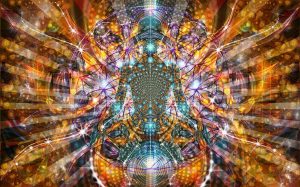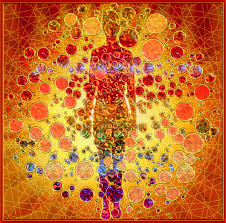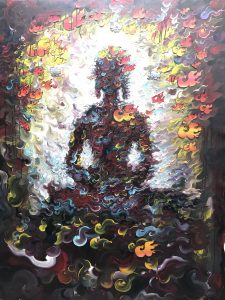 The Yogabliss on-line Moving into Meditation class met in the sanctuary of our homes this morning. I felt such a deep sense of gratitude that students are willing to continue to practice in these challenging times. Most of us are being asked to “contain” ourselves to avoid contagion. Others are on the front lines of healing risking their lives. Last night I listened to a very helpful talk, Meditation in an Emergency, given by meditation teacher and writer, Sam Harris, who says “we are in a strange state of emergency.” He describes our situation as one in which we are being forced to retreat. Yet we don’t retreat from the world entirely – most of us consume a steady stream of very worrying information. Our anxiety levels keep growing until we find ourselves overreacting to situations – many of which we have no control over.
The Yogabliss on-line Moving into Meditation class met in the sanctuary of our homes this morning. I felt such a deep sense of gratitude that students are willing to continue to practice in these challenging times. Most of us are being asked to “contain” ourselves to avoid contagion. Others are on the front lines of healing risking their lives. Last night I listened to a very helpful talk, Meditation in an Emergency, given by meditation teacher and writer, Sam Harris, who says “we are in a strange state of emergency.” He describes our situation as one in which we are being forced to retreat. Yet we don’t retreat from the world entirely – most of us consume a steady stream of very worrying information. Our anxiety levels keep growing until we find ourselves overreacting to situations – many of which we have no control over.
Sam observes that if we don’t take care with our hygiene we literally put others’ lives at risk. Everything we say – and how we say it – effects the minds of others too. Over the past few weeks there have been times I’ve displaced my own stress onto my very understanding partner. Sam suggests that we can gain real insight into the nature of anxiety through mindfulness. We can actually respond in the moment by releasing stress by “simply” letting go if it and beginning again. It’s easy to say but not easy to do. It takes training. Sam says mindfulness practice is a skill like riding a bike.
 Sam offered some helpful insights about anxiety. It is very useful. We don’t want to deprive ourselves of our survival instincts which often alert us to issues that require our attention, NOW. He counsels that it is not a matter of getting rid of anxiety, or fear but rather to let go of these emotions when they are no longer useful. There is a difference between feeling acutely anxious and chronic anxiety. These forms of stress come from completely different minds. He – and many other meditation teachers – insists that we have a choice which mind we will have. This happens every time we notice thoughts as thoughts and cascading emotions as processes. We can train our minds to enhance our well being and our ability to support the beings and matters we deeply care about.
Sam offered some helpful insights about anxiety. It is very useful. We don’t want to deprive ourselves of our survival instincts which often alert us to issues that require our attention, NOW. He counsels that it is not a matter of getting rid of anxiety, or fear but rather to let go of these emotions when they are no longer useful. There is a difference between feeling acutely anxious and chronic anxiety. These forms of stress come from completely different minds. He – and many other meditation teachers – insists that we have a choice which mind we will have. This happens every time we notice thoughts as thoughts and cascading emotions as processes. We can train our minds to enhance our well being and our ability to support the beings and matters we deeply care about.
Guided Relaxation
Here we are entering a new circle – this time in the virtual space we are creating together. We enter this moment bringing ourselves fully and wholly . . .
Body . . . Heart . . . Mind . . . Feel your breathing . . . bringing your whole awareness to the sensation of the pulse of breath moving in . . . the pulse of breath moving out . . . Feel the sensations of being alive . . . in your feet . . . legs . . . pelvis . . . low back . . . belly . . . upper back . . . chest . . . arms . . . hands . . . neck . . . head . . . The awareness of your body . . . the body sensations bringing you to this moment . . . this now . . .
 . . . We can extend our awareness to each other – in our virtual room . . . together we form a circle of human experience in which we share the intention of cultivating awareness and sensitivity – a kinship with life. We are drawn together to grow – like those trees whose roots connect underground and branch out and grow toward the light.
. . . We can extend our awareness to each other – in our virtual room . . . together we form a circle of human experience in which we share the intention of cultivating awareness and sensitivity – a kinship with life. We are drawn together to grow – like those trees whose roots connect underground and branch out and grow toward the light.
Here and now . . . we can pause . . . we can feel . . . embodied . . . together . . . growing . .
Poet Jane Hirshfield writes:
More and more I have come to admire resilience. Not the simple resilience of a pillow whose foam returns to the same shape again and again, but the sinuous tenacity of a tree: finding the light newly blocked on one side, it turns to another. A blind intelligence, true. But out of such persistence arose turtles, rivers, mitochondria (An organelle found in large numbers in most cells, in which the biochemical processes of respiration and energy production occur), figs . . . all this resinous unretractable earth.
Here, together, we are breathing . . . feeling . . . drawn to this place of life renewing life . . . perhaps with blind or intuitive intelligence . . . we are life seeking light . . . we are part of something so much more than our selves . . . we are part of deep time . . .
In his book, Underland, Robert MacFarlane writes:
. . . Deep time is the dizzying expanse of Earth history that stretch away from the present moment. Deep time is measured in units that humble the human instant: epochs and aeons, instead of minutes and years. Deep time is kept by stone, ice, stalactites, seabed sediments and the drift of tectonic plates. Deep time opens into the future as well as the past. The Earth will fall dark when the sun exhausts its fuel in around 5 billion years. We stand with our toes, as well as our heels, on a brink. . . . “
So often we dance around this awareness of our precarious place in space and time . . . the weight of the past . . . the uncertain ever perilous future . . . Current events have slowed this dance down . . . and we now share the present moments of deep time . . . the time in which reflections of what and who we hold dear rise to the surface of our awareness.
Robert MacFarlane urges us toward deep caring in saying:
 . . . to think in deep time can be a means not of escaping our troubled present, but rather of re-imagining it; countermanding its quick greeds and furies with older, slower stories of making and unmaking. At its best, a deep time awareness might help us see ourselves as part of a web of gift, inheritance and legacy stretching over millions of years past and millions to come, bringing us to consider what we are leaving behind for the epochs and beings that will follow us. . . .
. . . to think in deep time can be a means not of escaping our troubled present, but rather of re-imagining it; countermanding its quick greeds and furies with older, slower stories of making and unmaking. At its best, a deep time awareness might help us see ourselves as part of a web of gift, inheritance and legacy stretching over millions of years past and millions to come, bringing us to consider what we are leaving behind for the epochs and beings that will follow us. . . .
Here we are in our shared web of gift, inheritance and legacy . . . slowing time to deep time . . . slowing time to deep caring . . . considering what has come before, the gifts and blessings we have been given and those we have yet to give . . . What form do these gifts take in your life? What blessings can you bestow on others? Perhaps your gift is as simple and vital as calling someone to let them know you are thinking about them … wanting their well being. Perhaps it is expressing your own vulnerability in calling for help, sharing your struggles . . . Following your breath . . .
